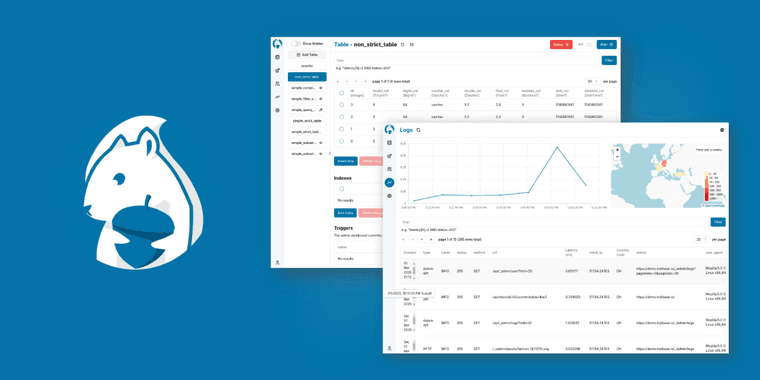Annotation
- Introduction
- WASM Runtime Transition
- File System Enhancements
- Kotlin Integration and Performance
- Pros and Cons
- Conclusion
- Preguntas frecuentes
TrailBase 0.19: Runtime WASM, Cliente Kotlin y Actualizaciones de la API de Archivos
TrailBase 0.19 presenta un runtime exclusivo de WASM, un cliente Kotlin y actualizaciones de la API de archivos, mejorando la seguridad y escalabilidad para el desarrollo backend moderno.

Introduction
TrailBase 0.19 represents a significant evolution for this open source Firebase alternative, introducing WebAssembly-exclusive runtime support alongside a new Kotlin client and substantial file API improvements. This release marks a strategic shift toward modern web standards while maintaining the platform's commitment to type-safe REST and real-time APIs that developers rely on for scalable applications.
WASM Runtime Transition
The most notable change in TrailBase 0.19 is the complete transition to WebAssembly (WASM) as the default execution environment, replacing the previous V8 runtime. This architectural shift enables better performance consistency across different deployment scenarios while providing enhanced security through sandboxed execution. While custom binary builds can temporarily restore V8 support, the development team confirms this is a transitional measure before full removal in future versions. The move to WASM-only execution aligns with modern web development trends and offers improved resource management for applications requiring reliable local web server performance.
File System Enhancements
TrailBase 0.19 introduces breaking changes to file handling by eliminating index-based file reads in favor of unique filename conventions. The new system generates filenames using patterns like {original_stem}_{rand#10}.{suffix}, effectively resolving stale cache issues that previously affected read-after-write operations. This improvement benefits developers working with persistent file storage and enhances data integrity across distributed systems. The changes also complement the platform's strengthened API client capabilities, providing more reliable file management for applications requiring robust data persistence.
Kotlin Integration and Performance
A major addition in this release is the official Kotlin client, expanding TrailBase's language support beyond existing options. The new client provides native Kotlin coroutines support and seamless integration with Android and JVM ecosystems, making it a valuable developer tool. Performance improvements extend to the reworked WASM execution model, which now supports component sharing of executors and implements work stealing for better resource utilization. These enhancements make TrailBase particularly valuable for teams using build tool pipelines and CI/CD tool workflows that demand consistent execution performance.
Pros and Cons
Advantages
- WASM-only runtime improves security and portability
- Official Kotlin client expands development ecosystem
- Enhanced file system resolves cache consistency issues
- Improved executor model boosts scalability
- MUSL Linux builds offer better deployment flexibility
- Stronger access rule validation increases security
- Record subscription filters enable precise data streaming
Disadvantages
- Breaking file API changes require migration effort
- V8 runtime removal may affect existing deployments
- Learning curve for developers new to WASM concepts
- Limited backward compatibility with older versions
Conclusion
TrailBase 0.19 delivers substantial architectural improvements that position it as a forward-thinking application server and alternative to traditional backend services. The WASM-focused runtime, combined with the new Kotlin client and refined file handling, provides developers with a more robust and scalable platform for modern application development. While the breaking changes require careful migration planning, the long-term benefits of improved performance, security, and cross-platform compatibility make this update a worthwhile investment for teams building next-generation web applications with sophisticated REST client requirements and real-time data needs.
Preguntas frecuentes
¿Cuál es el cambio principal en TrailBase 0.19?
TrailBase 0.19 transiciona a un runtime exclusivo de WASM, elimina el soporte para V8, introduce un cliente Kotlin e implementa cambios disruptivos en la API de archivos con convenciones de nombres únicos para una mejor gestión de la caché.
¿Puedo seguir usando V8 con TrailBase 0.19?
El soporte para V8 se elimina por defecto, pero las compilaciones binarias personalizadas pueden reactivarlo temporalmente. Sin embargo, está planeada la eliminación completa de V8 en versiones futuras, por lo que se recomienda migrar a WASM.
¿Cómo maneja el nuevo sistema de archivos los nombres de archivo?
El nuevo sistema utiliza patrones de nombres únicos como {original_stem}_{rand#10}.{suffix} para evitar problemas de caché y garantizar la integridad de los datos en operaciones de lectura después de escritura.
¿Qué beneficios de rendimiento ofrece WASM?
WASM ofrece ejecución en sandbox, mejor gestión de recursos y rendimiento consistente en todas las plataformas, mejorando la escalabilidad y seguridad de las aplicaciones.
¿Es el cliente Kotlin compatible con Android?
Sí, el cliente Kotlin se integra perfectamente con los ecosistemas de Android y JVM, admitiendo corrutinas para una programación asíncrona eficiente y un desarrollo moderno.
Artículos relevantes sobre IA y tendencias tecnológicas
Mantente al día con las últimas ideas, herramientas e innovaciones que dan forma al futuro de la IA y la tecnología.
Aplicación de chat Stoat: Guía completa de la rebranding y características de Revolt
La aplicación de chat Stoat se renombró de Revolt debido a presiones legales, manteniendo todos los datos, funciones y enfoque en la privacidad de los usuarios sin requerir ninguna acción de los usuarios existentes para una transición sin problemas.
Zorin OS 18: Sistema operativo Linux moderno con soporte para aplicaciones de Windows y nuevas funciones
Zorin OS 18 es una distribución de Linux con un escritorio rediseñado, soporte mejorado para aplicaciones de Windows y una herramienta de aplicaciones web, ideal como alternativa a Windows 10 con soporte a largo plazo hasta 2029.
AV Linux 25 y MX Moksha 25 lanzados con funciones mejoradas de administrador de archivos y máquinas virtuales
AV Linux 25 y MX Moksha 25 son nuevas versiones de Linux basadas en Debian Trixie, que presentan una gestión de archivos mejorada con integración de Quickemu y YT-DLP, diseñadas para producción multimedia y computación ligera.